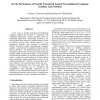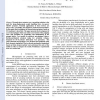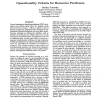36 search results - page 4 / 8 » Can a finite element method perform arbitrarily badly |
IPPS
2006
IEEE
14 years 1 months ago
2006
IEEE
A new class of parallel normalized preconditioned conjugate gradient type methods in conjunction with normalized approximate inverses algorithms, based on normalized approximate f...
CORR
2008
Springer
13 years 7 months ago
2008
Springer
Thermal micro-actuators are a promising solution to the need for large-displacement, gentle handling force, low-power MEMS actuators. Potential applications of these devices are mi...
WSCG
2003
13 years 8 months ago
2003
Simulations for training and analysis incorporating haptic feedback are becoming more popular and the sophistication of these simulations is increasing. Many systems now allow a r...
AAAI
1990
13 years 8 months ago
1990
Current explanation-based generalization (EBG) techniques can perform badly when the problem being solved involves recursion. Often an infinite series of learned concepts are gene...
VIIP
2001
13 years 8 months ago
2001
Graphics cards exercise increasingly more computing power and are highly optimized for high data transfer volumes. In contrast typical workstations perform badly when data exceeds...



